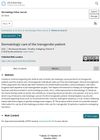 11 citations,
November 2009 in “Sports Medicine”
11 citations,
November 2009 in “Sports Medicine” Irregular menstrual cycles in exercising women may be linked to energy deficiency or hormonal imbalances, requiring careful diagnosis for proper treatment.
 10 citations,
January 2016 in “Dermatology Online Journal”
10 citations,
January 2016 in “Dermatology Online Journal” Hormonal therapy in transgender patients can lead to skin changes like altered sebum production, hair growth, and acne, which may require dermatological care.
 9 citations,
August 2014 in “Journal of The American Academy of Dermatology”
9 citations,
August 2014 in “Journal of The American Academy of Dermatology” Hormonal imbalances may play a role in frontal fibrosing alopecia, and antiandrogenic drugs combined with steroids are currently the most effective treatment.
 9 citations,
July 1995 in “Veterinary Clinics of North America: Small Animal Practice”
9 citations,
July 1995 in “Veterinary Clinics of North America: Small Animal Practice” The document concludes that hair loss in cats is caused by various factors, including allergies, mites, infections, and hormonal issues, with treatments varying accordingly.
 8 citations,
April 2017 in “Medical Hypotheses”
8 citations,
April 2017 in “Medical Hypotheses” Men with early balding may have hormonal imbalances similar to women with PCOS and could benefit from similar treatments.
 8 citations,
January 1996 in “Springer eBooks”
8 citations,
January 1996 in “Springer eBooks” Male pattern baldness may be caused by factors like poor blood circulation, scalp tension, stress, and hormonal imbalances, but the exact causes are still unclear.
 7 citations,
March 2016 in “Journal of Cosmetic and Laser Therapy”
7 citations,
March 2016 in “Journal of Cosmetic and Laser Therapy” Home-use lasers and IPL devices are unlikely to directly cause paradoxical hair growth; it may be linked to inflammation or hormonal issues.
6 citations,
April 2009 in “Obstetrician & gynaecologist/The obstetrician & gynaecologist” Hirsutism in young women is often caused by PCOS and managed with lifestyle changes, treatments, and hormonal therapy, which takes 9-12 months to work.
 6 citations,
March 1982 in “Clinical and Experimental Dermatology”
6 citations,
March 1982 in “Clinical and Experimental Dermatology” The document says that hair loss in women is often due to androgenic alopecia, similar to male baldness, and that hirsutism is treated with hormonal and cosmetic methods.
 6 citations,
July 1975 in “Archives of Dermatology”
6 citations,
July 1975 in “Archives of Dermatology” Rapid weight loss from dieting and hormonal injections can cause significant hair loss in women.
 5 citations,
January 2023 in “Fertility and sterility”
5 citations,
January 2023 in “Fertility and sterility” Doctors are preparing to potentially perform uterus transplants in transgender women, considering technical, hormonal, and ethical factors.
 5 citations,
April 2019 in “Journal of The American Academy of Dermatology”
5 citations,
April 2019 in “Journal of The American Academy of Dermatology” Frontal Fibrosing Alopecia may be a complex condition linked to hormonal changes in women, not just a form of Lichen Planopilaris.
 5 citations,
August 2014 in “Journal of The American Academy of Dermatology”
5 citations,
August 2014 in “Journal of The American Academy of Dermatology” Smoking doesn't cause or prevent Frontal Fibrosing Alopecia, hormonal imbalance may be involved, and a combination of antiandrogens and steroids can help stabilize the condition.
 5 citations,
March 2014 in “Journal of The American Academy of Dermatology”
5 citations,
March 2014 in “Journal of The American Academy of Dermatology” The study suggests hormonal factors may play a role in Frontal Fibrosing Alopecia and that treatments like oral antiandrogens and steroids could be beneficial.
 5 citations,
January 2014 in “Postepy Dermatologii I Alergologii”
5 citations,
January 2014 in “Postepy Dermatologii I Alergologii” Hormonal treatments like birth control pills can improve acne in women with excess hair growth and hormone imbalances.
5 citations,
August 1999 in “Disease-a-month” Hormonal imbalances can cause acne, and treatments may include hormone-blocking medications.
 4 citations,
May 2021 in “Dermatologic Clinics”
4 citations,
May 2021 in “Dermatologic Clinics” The conclusion is that hair loss in women is caused by a mix of hormonal, environmental, and genetic factors, and treatments should target these various causes.
 4 citations,
January 2019 in “PubMed”
4 citations,
January 2019 in “PubMed” Patterned hair loss in women is linked to hormonal imbalances and biochemical changes, and should be evaluated for underlying health issues.
4 citations,
December 2017 in “Journal of zoo and wildlife medicine” Hormonal changes during the reproductive cycle may cause seasonal skin problems in captive female fossas.
 4 citations,
March 2013 in “Neuropsychiatric Disease and Treatment”
4 citations,
March 2013 in “Neuropsychiatric Disease and Treatment” A woman with anorexia and Cushing's syndrome improved after tumor removal, highlighting the need to consider hormonal issues in psychiatric conditions.
4 citations,
February 2011 in “Annals of internal medicine” The document concludes that Polycystic Ovary Syndrome is a commonly underdiagnosed hormonal disorder in women, diagnosed by specific criteria.
 4 citations,
January 2011 in “Dermatology”
4 citations,
January 2011 in “Dermatology” A patient grew extra hair on their ears after treatment for testicular cancer, possibly due to hormonal changes or genetics.
 3 citations,
January 2019 in “Cureus”
3 citations,
January 2019 in “Cureus” Hormonal imbalances in Polycystic Ovarian Syndrome (PCOS) might trigger a rare skin disorder called Confluent and Reticulated Papillomatosis (CRP), so dermatologists should consider checking for PCOS in CRP patients.
 2 citations,
March 2004 in “Reviews in Gynaecological Practice”
2 citations,
March 2004 in “Reviews in Gynaecological Practice” Hormonal changes and psychological issues can cause sexual dysfunction in postmenopausal women. Behavioral therapy is recommended first, with hormone replacement helping some symptoms but not libido. Testosterone can improve libido, but its effects on overall sexual function are unclear. Emotional and relationship issues should be addressed before using medication, and the benefits and risks of testosterone supplementation should be considered.
 1 citations,
April 2024 in “Sri Lanka Journal of Obstetrics and Gynaecology/Sri Lanka Journal Of Obstetrics and Gynaecology”
1 citations,
April 2024 in “Sri Lanka Journal of Obstetrics and Gynaecology/Sri Lanka Journal Of Obstetrics and Gynaecology” PCOS is a common hormonal disorder in women that can lead to serious health problems.
1 citations,
January 2024 in “Journal of personalized medicine” Hormonal imbalances during menopause may significantly contribute to Frontal Fibrosing Alopecia.
 1 citations,
January 2022
1 citations,
January 2022 Myo-inositol and D-chiro-inositol improve hormonal and physical symptoms in teenage girls with PCOS.
1 citations,
August 2021 in “Arhivʺ vnutrennej mediciny” Hormonal imbalances can cause hair loss, and understanding them can help develop better treatments.
 1 citations,
September 2020 in “Endocrinology, Diabetes & Metabolism Case Reports”
1 citations,
September 2020 in “Endocrinology, Diabetes & Metabolism Case Reports” The conclusion is that thorough investigation of hypertension and hormonal dysfunctions is important, and there may be a link between these conditions and cancer.
 1 citations,
March 2011 in “Informa Healthcare eBooks”
1 citations,
March 2011 in “Informa Healthcare eBooks” Hormonal therapy is effective for treating acne in adult women, especially with signs of high androgen levels.
























